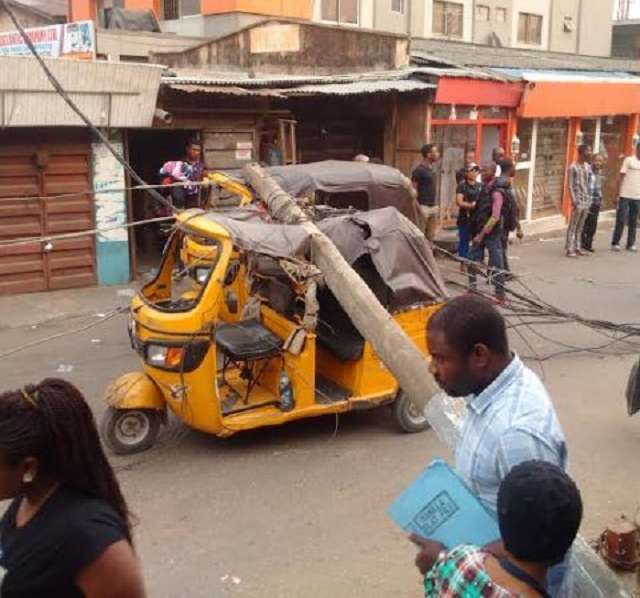They sway and dangle from electric poles, constituting a scary sight. Some hang so low that you could touch them with your hands. These sagging and hanging cables and wires have become a familiar sight in major cities across Nigeria. And the situation has become a serious cause of concern as it poses a threat to life.
With cluttered electrical wires on zinc-coated rooftops and frequent sparks from loose cables, grave danger is indisputably hanging in the air. The hazard is palpable, yet, many who are directly affected and the authorities seem unperturbed by the unhealthy situation.
Many who live and do business close to the cluttered wires have been paying heavily for their ignorance or lackadaisical attitude towards such danger. Wires often snap from the pole or transformer, spreading hazard to the residents. The danger doubles during the rainy season, particularly for children who are not aware of the need for precautions near electricity cables and wires. Many have lost their lives, even as varying degrees of injury have been inflicted on victims. Property worth billions of Naira has also been lost to infernos erupting from electric circuits.
Many electricity connections in communities across Nigeria are poorly wired. As the houses are cramped, so are cables intertwined haphazardly into different apartments, exposing the occupants to diverse risks. According to experts, the associated risks range from electric shock to psychological damage, burns, neurological damage and ventricular fibrillation, which often lead to death.
Daily Sun learnt that most of the electrical installations in many makeshift homes and remote areas are done by ill-trained electricians that are not under the employ of any electricity distribution company serving the communities.
Speaking on the dangers of cables making contact with zinc roofs, an electrical engineer in Lagos, Mr. Sunday Akindayo, said it is a reasonable conductor of electricity because it has a density of 7.140 grams per millimetre (g/ml). He said some homes with no earthing systems to protect them from accidental discharge of electricity also have wires dangling on their roofs and walls. He maintained that untangling the live wires should be a priority for the authorities and queried why live wires were tangled in the first place. Akindayo said, when not properly controlled or harnessed, electricity can result in serious danger to those who use it.
He advised that electricity poles should only be used for electricity wires and not for additional purposes. He explained that such could mount pressure on the wires and consequently shift them from permanent and safe positions. Recently, at Agbelekale area in Alimosho Local Government Area of Lagos, as a result of the gusty winds and rainfall, there was a series of consistent sparks from cables in the area. A witness said people scampered for safety as the sparks continued for about four minutes. For days, the community was thrown into darkness until the fault was rectified.
The expert, however, urged residents to take precautions against dangling and loose cables. He also tasked parents to educate their children to the dangers in loose wires. He charged them to promptly call on the appropriate authorities to rectify any faults. Three weeks ago, a resident of Ikotun area of Lagos, Mr. Kingsley Ibezim, raised the alarm over an exposed cables in his area, calling on the authorities to quickly do the needful to avoid electrocution.
Said he: “The beauty of the work done by the Lagos State government in the area of road construction and maintenance may turn into mourning if urgent steps are not taken within the next 48 hours to repair an eroded electric cable on the ground opposite the gate that leads into Ikotun, off the Ikotun-Egbe-Ejigbo Road. This is the exact place where commuter buses make a U-turn to return to Cele Express.
“The cable supplies electricity to the phalanx of streetlights installed on that part of Ikotun-Egbe-Ejigbo. The cable, which was once insulated and passed through a plastic pipe is now exposed as the insulating material and plastic pipe have broken and damaged under the tyres of uncountable number of buses, tricycles and motorcycles making U-turns at the spot.
“The rainy season is kicking in and flood from the blocked drainage in Ikotun market flows across the road to empty into the canal on the side of the road. Imagine when the flooding happens on the day and time when the cable is energised. Several people would be electrocuted before power supply is cut off.
“That is why the chairman of Ikotun-Igando LCDA and the Lagos State Public Works Corporation need to urgently replace the cable and also protect it with a concrete overlay. A stitch in time will avert mass electrocution.”
Mr. Alfred Dada, who resides in the Agege area of Lagos, told Daily Sun that he had raised the alarm on several occasions over cables within touching distance, but help always came when the damage had been done.
“It is very dangerous to have electric wires hanging haphazardly, as one can get electrocuted. Children are highly vulnerable as they are unaware of the danger. The authorities should take concrete measures in resolving such situations as timely as possible. Proactive measures are the best ways to solve such problems that could lead to loss of lives,” he said.
The baale of Iwo community in Sango, Ogun State, Chief Obafemi Akinwunmi, who complained of how electricity supply to many houses was badly configured, urged the authorities to correct the configuration, since it is charged to operate the facilities. He said this was necessary to forestall disaster.
“If the electricity distribution companies are giving bills and collecting revenues from communities with poor and questionable connections, it suggests that they may have deliberately ignored the dangers posed to their customers. It is also a display of utter disregard to safety codes set up by the Nigerian Electricity Regulatory Commission (NERC) to ensure safe use of electricity in the country,” he said.
A civil service servant with the Ministry of Environment, Lagos Sate, who didn’t want his name mentioned, said Nigeria should begin to think of laying underground wires. Though he admitted that the system was very expensive to run, he declared that it was safer than overhead connection, which is exposed to many adverse forces. He also called for a careful insulation of electric wires so that they do not come in contact with other wires.
“If underground laying of electricity wires could be achieved in Festac town, it can be achieved throughout the country. It is also another way of beautifying any city.
“People should not construct buildings very close to the wires. They should see that there is a minimum space of three to four metres from the building. Residents should also take an initiative to get the wires insulated and make sure that trees and other impediments do not affect the cables,” he said.
Source: THE SUN









